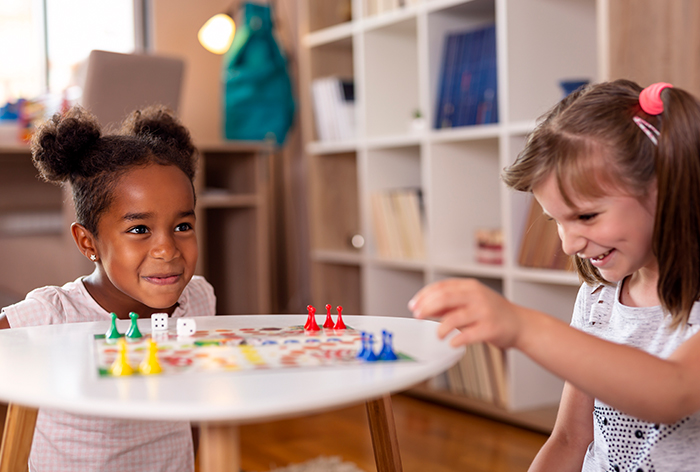Playing games, practicing math!
Posted on February 12, 2020 at 6:00 am

By Rachel Edmondson
I have always been a fan of games. When my kids were younger, I could hardly wait for them to be old enough to move on from Candy Land to more interesting games—ones that I could actually enjoy too!
When thinking about games, we often think about reasoning and strategy, which are both very important skills, but many games also help kids practice a variety of other math skills. At each stage of development, it’s been fun to watch my kids as they learn how to play a game and also to see all the new math skills they are learning and practicing without even thinking about it.
Here are a few games my family has discovered over the years and some of the math skills involved in each one. I’ve listed them in order by manufacturer’s recommended age, but we’ve found that our kids have been able to play quite a few of these at a younger age than suggested.

Snug as a Bug in a Rug
By Peaceable Kingdom
Recommended age 3+, 2–4 players
This cooperative game helps preschoolers practice all sorts of skills as they try to tuck their cute bugs snug under the rug while avoiding the dreaded stink bugs. Math related skills include numbers, shapes, counting, and the concept of big and little.

Rat-a-Tat-Cat
By Gamewright
Recommended age 6+, 2–6 players
In this game, less is more. Players will need to use addition to figure out how many points they have as they try to swap out cards until they think they have fewer points than their opponents.

Thumbs Up!
By Blue Orange
Recommended age 6+, 2–6 players
Players race to be the first to put colored rings on their thumbs in the correct order. All of the challenges require an understanding of numerical order. Some work on number recognition, while others help kids practice subitizing—a fancy word that means being able to look at a small group and know without counting how many are there, such as the dots on a domino.

Tenzi
By Tenzi
Recommended age 7+, 2+ players
This game is simple and fast-paced. Each player has 10 dice and rolls until they get 10 of the same number. Quick decision making on which number to roll for and whether or not to switch to a new number part way through are made possible by subitizing.

Kingdomino
By Blue Orange
Recommended age 8+, 2–4 player
This is one of my family’s current favorites. Players collect tiles that represent different landscapes, such as woods or wheat, and use them to build their kingdom. Players will need to use multiplication since you score points by multiplying the number of squares of a specific landscape that you’ve connected by how many crowns you have on that landscape.

Sleeping Queens
By Gamewright
Recommended age 8+, 2–5 players
This is a longtime favorite. Players try to awaken and collect queens to win, while also using cards to try to steal or put to sleep other player’s queens and protect the queens they’ve collected. Number cards aren’t helpful except to turn them in to get new cards, and the more numbers you can use in an addition equation, the more cards you can turn in.

Qwixx
By Gamewright
Recommended age 8+, 2–5 players
Players roll colored and regular dice and then use the probability of certain numbers being rolled again to decide which numbers to cross off on their score sheet. Calculating the final score requires some advanced addition skills, and sometimes a bit of subtraction. Players must understand numerical order to play this game.
Of course, there are many classic games that also require the use of math skills. One of our favorites is Uno, by Mattel Games, which requires number recognition and an understanding of one-to-one correspondence (that dreaded Draw Four means that you have to understand how to count out 4 cards, not just how to count to four).
We also enjoy Phase 10, by Mattel Games, which practices both number recognition and numerical order, and Yahtzee, by Hasbro Games, which is great for older kids who are learning multiplication and have more advanced addition skills.
I hope you enjoy these games as an engaging way to practice math. Be sure to share your favorite games that include math skills in the comments.

Tags: addition, board games, cards, counting, dice, Families, games, kids, learning, math, multiplication, parents, playing, subtraction
